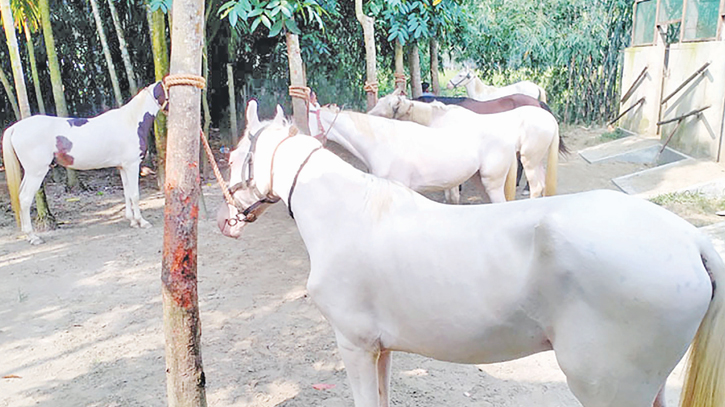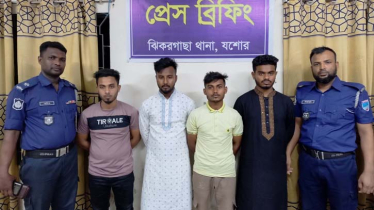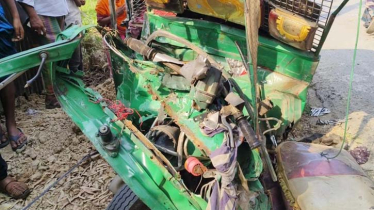
The country’s very first commercial horse farm in Begunbari Kokil village of Mymensingh Sadar is attracting visitors. This photo was taken recently. Photo: Messenger
The country's very first commercial horse farm in the scenic Begunbari Kokil village of Sadar Upazila in Mymensingh has drawn attention from various quarters. Notably, horses have already been purchased by the Bangladesh Army and Ansar Academy, while affluent individuals from the upper echelons of society have embraced horse ownership as a hobby.
Established by the enterprising 34-year-old Shariful Islam Sanju, a BBA graduate from Atish Dipankar University, the 'Sanju Horse Farm' has already become a hotbed of interest for horse enthusiasts and connoisseurs.
Sanju's dream was born from his passion for horse racing, which he cultivated from an early age. Following his education, he started racing with a horse acquired from his mother in 2007 and swiftly made a name for himself, clinching accolades and cash prizes in races across the nation. Tragically, his beloved horse fell ill and passed away, but this setback didn't deter Sanju; it only fueled his aspirations for something grander.
In 2021, Sanju procured several horses of Sindhi, Marwari, and Nokra breeds from the Indian provinces of Rajasthan and Punjab. With this, he inaugurated the nation's inaugural commercial horse farm, aptly named 'Sanju Horse Farm.' Today, the farm is home to seven remarkable equine specimens, and each horse's price ranges between Tk 2 to Tk 5 lakh.
Sanju shared his elation, stating, "I am very profitable," affirming that his dreams and dedication have paid off. Moreover, he highlighted the need for local horse production, as the country relies on imports to meet its demand for these magnificent creatures. "Government cooperation is essential in this regard," he emphasized.
Sanju underscored the historical significance of horse racing, which used to be a traditional village sport in Bengal. Sadly, the dwindling availability of high-quality racing horses in the country has cast a shadow over this time-honored tradition. To invigorate the youth and provide alternatives to drug addiction, he proposed organizing national and international horse races, emphasizing the sport's global popularity and its recognized health benefits.
Roknuzzaman, a farm worker, elucidated the dietary needs of the horses, which primarily consist of chickpea boots, rice husks, hay, and green grass. He pointed out that despite the occasional kick or bite, care is rendered with devotion as these horses are considered pets.
Local resident Md. Sadek Ali marveled at the beauty of the horses, noting that the creatures, once seen only on the silver screen, are now being raised in their community. Visitors from across the nation are flocking to witness this remarkable farm firsthand.
However, the journey to the farm is hindered by the dilapidated road leading to it. The local community is now vociferously demanding the road's renovation to facilitate better access.
When queried, Dr. Rahela Parveen Ruma, the additional livestock officer of the district, assured the public of continued support for the horse farm. Nevertheless, she explained that horses currently lack a specific registration category within livestock regulations, prompting the Forest and Environment Department to investigate the matter of registration.
Messenger/Disha








